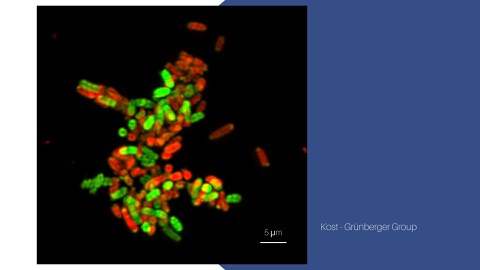Altruistic suicide in multicellular clusters of bacteria: causes and consequences
- Prof Dr Alexander Grünberger Institute of Process Engineering in Life Sciences: Microsystems in Bioprocess Engineering, Karlsruhe, Institute of Technology.
- Prof Dr Christian Kost Universität Osnabrück, Fachbereich Biologie/ Chemie.
|
Bacteria mainly occur within multicellular groups. These spatially structured communities commonly display behaviours that are beneficial to the group, yet costly to the acting individual. An example is the altruistic suicide of cells that has been suggested to benefit cellular aggregates by providing nutrients to clonemates or facilitating dispersal of clusters. While several causal genes have been identified, knowledge on the evolutionary conditions favoring programmed cell death in bacteria remains rudimentary. One reason for this is the lack of techniques that allow to observe and analyze bacterial groups with single-cell resolution, which is crucial to investigate the ecological consequences of cell lysis. This project aims at addressing this issue. We take advantage of a model system, in which a metabolic cooperation evolved between two genotypes of Escherichia coli. The evolution of mutualistic cooperation was due to the formation of multicellular clusters that benefitted cooperative mutants within clusters. Interestingly, lineages evolved a life cycle, in which cells switched between a single-cell and a multicellular cluster-stage. This pattern correlated with an increased proportion of dead cells that rose significantly over the course of the evolution experiment. Our project aims at identifying the molecular drivers of cell lysis as well as at unravelling the evolutionary consequences for multicellular clusters. For this, we will combine transcriptomic analyses of mutants with carefully designed coculture experiments. In addition, we will develop a novel microfluidic platform to grow, observe, and analyze three-dimensional multicellular clusters with single-cell resolution. By identifying the molecular causes and eco-evolutionary consequences of cell lysis in bacteria, our project will contribute to a better understanding of this widespread group-level behaviour. |
| Researcher |
| Miriam Epping (PhD Student) |
Contact Us
Karlsruhe Institute of Technology (KIT)
Email alexander gruenberger@kit edu
Tel + 49 721 608 45200
University of Osnabrück
Email christian.kost@uos.de
Tel + 49 541 969 2853

